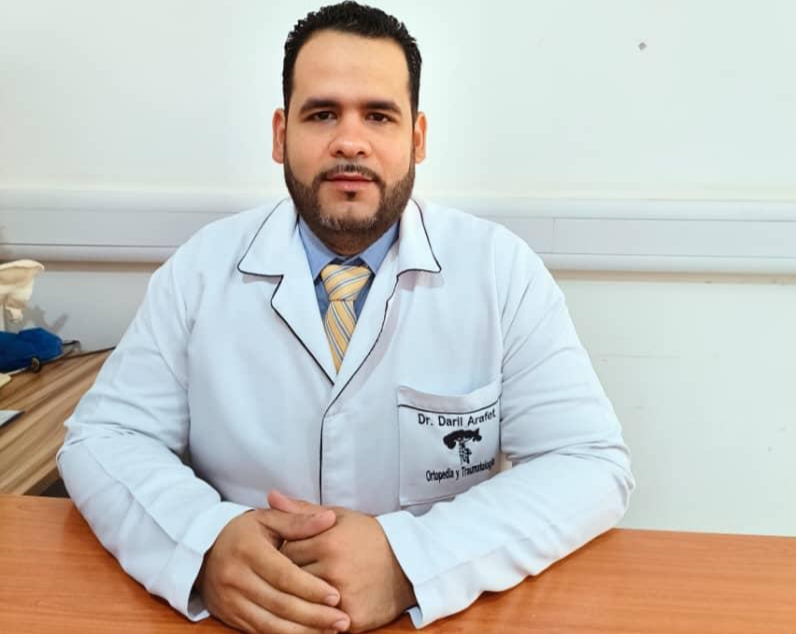Author: Dr. Daniel Arafet Daril (Orthopedic Specialist | UMC Victoria Hospital)
Knee pain is a common condition that occurs due to various factors. Four of your bones are involved in making the knee joint. It is one of the major joints of the body, and any structural abnormality or disease can limit the movement of this joint. Problems with your knee joint can restrict the overall movement of one or both legs and can be a debilitating factor for day-to-day routine work. The majority of the cases of knee pain can be treated with symptomatic care, physiotherapy, and medications. In severe cases, surgical options may be the last resort.
What causes knee pain?
Your knee joint is made of bone, cartilage, ligaments, and fluid. Muscles and tendons help the knee joint move. When any of these structures is damaged, you have knee problems.
These are some of the more common causes of knee pain:
- Osteoarthritis. The cartilage in the knee gradually wears away.
- Rheumatoid arthritis. The knee may become swollen and cartilage may be destroyed.
- Ligament injuries. Anterior cruciate ligament (ACL) injuries usually result from a sudden twisting motion. Injuries to the posterior cruciate ligament (PCL) are usually caused by a direct impact, like impact from a car accident or sports activities.
- Tendon injuries. These can range from inflammation to a tear, most likely from overuse in sports or from a fall.
- Cartilage injuries and disorders. Injury, overuse, muscle weakness, or misalignment of the knee can soften the cartilage of the kneecap, or a blow to the knee may tear off a piece of cartilage.
- Broken kneecap. The small, round bone (patella) that sits over the front of your knee joint breaks, usually as the result of a fall or a direct blow to the knee.
Symptoms
If you can’t put weight on your knee, feel sick, have a fever, or if your knee is red and hot, consider going to the ER. You might have a fracture or infection:
- For many fractures, you need to be immobilized to prevent movement of the bone or joint. You might even need surgery.
- Infections can be managed but need attention right away.
- Putting off seeing a doctor may hinder healing
Other symptoms for which you should get medical help right away:
- Unbearable pain
- Pain that doesn’t get better with rest
- Pain that wakes you
- Drainage of pus or fluid
- Large wounds
- Puncture wounds
- Swelling, if you’re on a blood thinner (warfarin or Coumadin) or have a bleeding disorder (like hemophilia)
Why should I see a pain management specialist?
Pain management is an important part of any treatment plan, both for lessening discomfort and aiding in recovery. Pain management specialists understand the full range of pain relief options and how to use these options in combination.
Knee pain is itself a symptom of multiple underlying diseases. Pain in the knee joint area is often accompanied by swelling around the joint, tenderness, redness, reduced mobility, and inability to stretch leg muscles. Some cases may also present with popping sounds from the knee joint. The joint becomes stiff in certain cases, and its movement becomes limited. Long-term knee pain can also lead to loss of muscle volume in the affected leg or legs.
How are knee problems diagnosed?
In addition to a complete medical history and physical exam, other tests for knee problems may include:
- X-ray.
- Magnetic resonance imaging (MRI).
- Computed tomography scan (also called a CT or CAT scan).
- Arthroscopy.
- Radionuclide bone scan.
Prevention
Knee pain can be prevented to some extent by maintaining a healthy weight and an active lifestyle. Stretching exercises are helpful to prevent knee pain, especially if you are preparing to do heavy physical activity. If you have a sedentary lifestyle like long office work hours, take a few breaks in between to stretch your legs and facilitate joint movement. Diet and nutrition are also necessary factors to avoid other associated complications. It is better to wear knee caps before participating in any athletic or sports activity that may have a risk of damaging your knees.
If you are experiencing any of the above mentioned symptoms, come see a Pain Management Specialist/Orthopedic Specialist at UMC Victoria Hospital located in Bukoto opposite Biplous furniture store.
